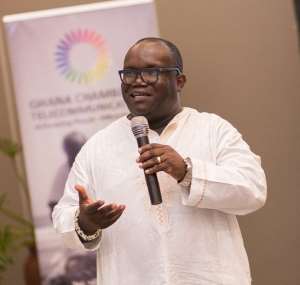
The Ghana Chamber of Telecommunications has announced that the mobile network operators and infrastructure companies in 2019 made a staggering taxes and other remittances of GHS3.2 billion to support the socio-economic development of the country.
This figure represents approximately 9.5% of Ghana's annual total revenue basket and has been confirmed following a study conducted by the mobile industry association.
Confirming the figure at a press conference in Accra, Dr Ing. Kenneth Ashigbey, the Chief Executive Officer (CEO) of the Chamber noted that the telecom industry continues to commit investible funds into capital expenditure to meet customer service quality and experience needs.
“CAPEX investment has increased exponentially in the fiscal year, however, there is the need for policy to support and enable even more investment by all players into the ecosystem to meet customer demand for mobile services,” he noted.
 Dr. Ing. Kenneth Ashigbey
Dr. Ing. Kenneth Ashigbey
According to him, a study noted that mobile industry believes that policy enablers such as tax reforms, tax rebates in relation to the import of infrastructure and equipment's could improve the affordability of mobile technology and services for customers yielding greater strides for all stakeholders in the Data from the study showed.
The study noted that the industry wields over 41 million active voice SIMS, 28 million active data subscribers, 14.5 million active mobile money customers and over 300k active merchants/agents.
The study added that an "appropriate spectrum management framework [by the industry regulator] will provide needed clarity for more funding into existing, and new technologies such as 4G and 5G, which requires further policy direction and support to grow."
Dr Kenneth Ashigbey in concluding said Mobile is the most cost-effective way of extending access to ICT, the internet in Ghana as well as driving the digitization agenda pursued by the ruling NPP government.
He stressed that it is therefore fundamental to helping government achieve its objectives of expanding the ICT infrastructure, meeting last-mile goals, connecting the unconnected, and positioning our economy as a smart and digital-ready market towards further growth.
Key highlights from the study:
The study from the Ghana Chamber of Telecommunications shows Communication Service Tax (CST) was GH¢414m, Value Added Tax (VAT) GH¢480m; Corporate Income Tax (CIT) GH¢832m; Withholding Tax (WHT) GHe415 million, Import Duties, GH¢210 million and National Fiscal Stabilization Levy (NFSL) was GHe71m.
The Surcharge on International Incoming Traffic (SIT) was GH¢107 million in 2019; SIIT is the quantum of six cents per every minute of call that comes from overseas into the country.
Mobile Network Operators pay that to the National Communications Authority (NCA), the industry Regulator.
There is also the pay-as-you-earn (PAYE) tax, which stood at GHc96 million and finally the National Fiscal Stabilisation Levy (NFSL), which is GH¢71 million. NFSL was introduced in 2013 to stabilise the economy over a period of 18 months, ending December 2015. This tax has continuously been renewed.
The study also shows the mobile industry widely provides 6,700 direct jobs and over 1.8 million indirect jobs, contributing 2.93% to (Non-oil) GDP, and invested GH¢1.55 billion in capital expenditure within the fiscal year 2019.





 'Kill whoever will rig Ejisu by-election' – Independent Candidate supporters inv...
'Kill whoever will rig Ejisu by-election' – Independent Candidate supporters inv...
 Ashanti Region: ‘Apologize to me for claiming I owe electricity bills else... – ...
Ashanti Region: ‘Apologize to me for claiming I owe electricity bills else... – ...
 Ghana is a mess; citizens will stand for their party even if they’re dying — Kof...
Ghana is a mess; citizens will stand for their party even if they’re dying — Kof...
 Internet shutdown an abuse of human rights — CSOs to gov't
Internet shutdown an abuse of human rights — CSOs to gov't
 Free SHS policy: Eating Tom Brown in the morning, afternoon, evening will be a t...
Free SHS policy: Eating Tom Brown in the morning, afternoon, evening will be a t...
 Dumsor: A British energy expert 'lied' Ghanaians, causing us to abandon energy p...
Dumsor: A British energy expert 'lied' Ghanaians, causing us to abandon energy p...
 What a speech! — Imani Africa boss reacts to Prof. Opoku Agyemang’s presentation
What a speech! — Imani Africa boss reacts to Prof. Opoku Agyemang’s presentation
 Dumsor: Tell us the truth — Atik Mohammed to ECG
Dumsor: Tell us the truth — Atik Mohammed to ECG
 Dumsor: Don't rush to demand timetable; the problem may be temporary — Atik Moha...
Dumsor: Don't rush to demand timetable; the problem may be temporary — Atik Moha...
 Space X Starlink’s satellite broadband approved in Ghana — NCA
Space X Starlink’s satellite broadband approved in Ghana — NCA
